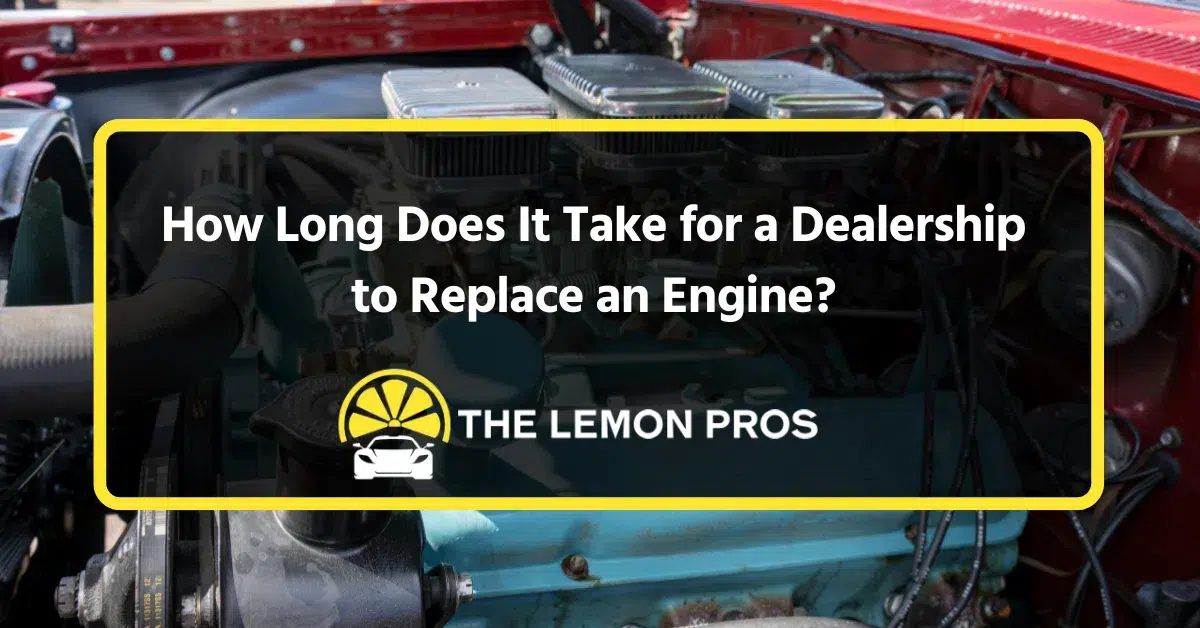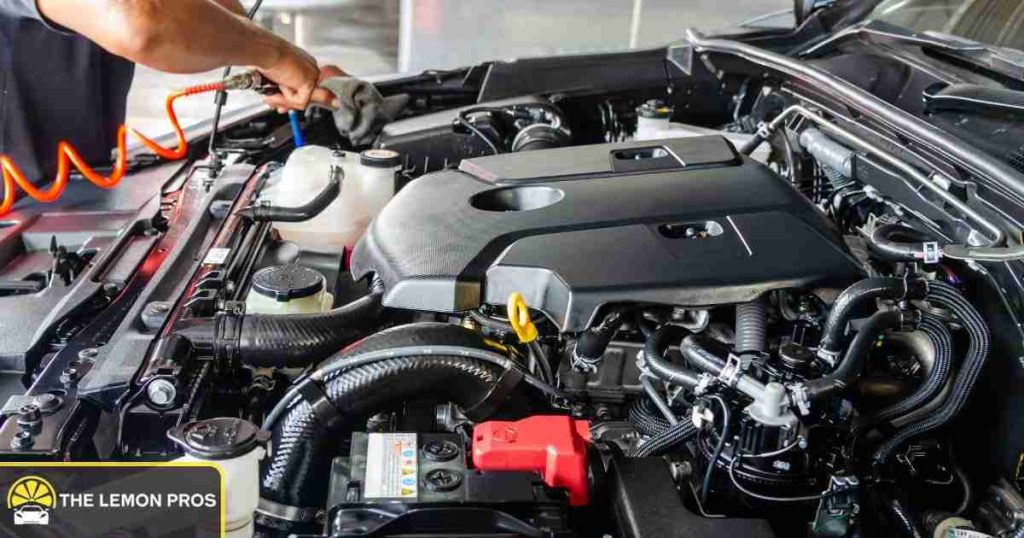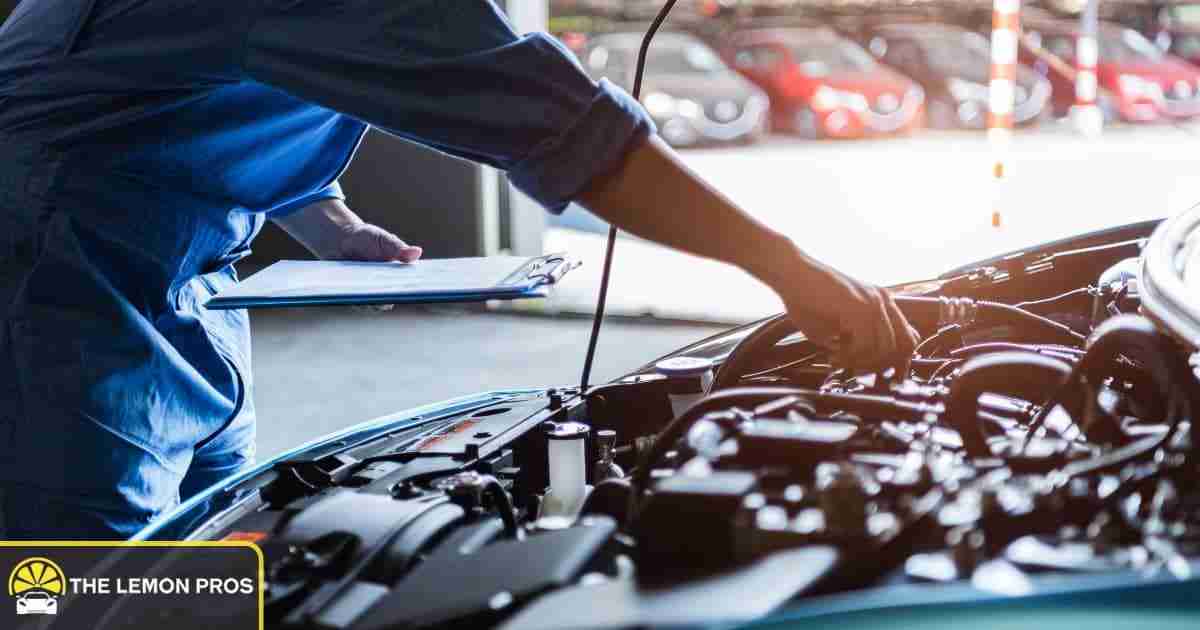
How Long Does It Take for a Dealership to Replace an Engine?
While it’s nothing that most drivers want to think about, some vehicle defects can lead to an engine replacement. It shouldn’t take a dealership longer than two weeks to have the engine replaced, considering the job itself is usually between ten and 12 hours. If the dealership can’t have the replacement engine installed in a reasonable time, you may need to seek further advice from your lawyer.
The Lemon Pros have the experience needed to get your car back and speed up the car engine related repairs in California. Our main practice area revolves around dealing with defective cars, making us experts in the field that can tackle any issue. Get a free case evaluation to see how we can help you.
Within this post, we will discuss the average timeframe for a replacement engine and break down why it could take longer. We also offer a few tips to reduce the time of engine replacements.
Table Of Contents
- What Does Engine Replacement Involve?
- Factors Affecting Engine Replacement Time
- When to Consult a Lemon Law Attorney
- Dealership Has Had My Car For a Month for a Replacement Engine: What to Do?
- How Much Does It Cost to Replace an Engine?
- Need a Lemon Law Attorney to Deal with the Dealership?
- FAQ
- How Long Does It Take for a Dealership to Replace an Engine in California?
- Can I Drive My Car While Waiting for Engine Replacement at the Dealership?
- How Much Should It Cost in Labor to Replace an Engine?
- Is Getting a New Engine Like Getting a New Car?
- How Long Does It Take to Remove an Engine?
- What Is the Average Timeframe for a Lemon Law Claim in CA?
What Does Engine Replacement Involve?
Engine replacement involves removing the old engine and installing a new or rebuilt motor. To get to the engine and remove it, there are a lot of other parts that need to be removed first.
The engine is comparable to the brain of the body; it's essential for running every major system. Therefore, everything that's connected to it must be removed or unplugged before the engine can be taken out. During the engine replacement process, you can expect the following steps to occur:
Initial inspection: The technician will perform diagnostic checks to confirm that the engine needs to be replaced. In some instances, a module or sensor is all that's causing problems, which is a much easier fix.
Order parts: Once the engine has been deemed to be the cause, the technician orders the parts needed for replacement. For the job to be done right, there's more than just an engine required. The shop also installs new gaskets to ensure everything is sealed properly. Other maintenance items may be replaced at the same time.
Engine removal: After the engine arrives, the old one is removed. This process can take several hours, depending on everything that needs to be disconnected and how hard it is to get to the engine. Additionally, it is the technician's job to store everything carefully for the reinstallation of the new engine.
Engine installation: When the new engine is ready, installation occurs. The time varies depending on the type of engine it is and how much other work has to be done, reconnecting all of the other components. With high-end or luxury cars, the process can take much longer than with a domestic four-cylinder.
Testing and calibration: After the engine replacement, the technician needs to check everything over to ensure it is running properly. The engine will be checked, and the vital systems will be calibrated.
How Long Does It Take for a Dealership to Replace an Engine?

The time it takes to put a new engine in is typically only ten to 12 hours. However, the dealership isn’t going to complete the job in one day, and you will be required to leave your vehicle at the shop. In most cases, the dealership should have your car back to you within one to two weeks for engine replacement.
If the work is covered under the factory warranty, the dealership shouldn’t hold your vehicle for more than thirty days. Any longer than this, and you may have the right to file a Lemon Law claim.
In rare cases, the dealership may agree to replace the engine in a day; however, this isn’t a common practice. Most commonly, the dealership wants time to verify that the engine failed, swap it out for a new one, and test everything over a few days to ensure it is done right. Engine swaps aren’t to be taken lightly, and there’s a lot to verify before giving a customer back their car.
What Can Prolong the Process?
Engine and transmission replacement are some of the most difficult jobs performed by a repair shop. There are a lot of connections to secure, seals to test, and overall quality control that must be done before giving the car back to a customer. Engine diagnostics can also play into the time the shop needs the car.
As we’ve learned over the past few years, part shortages are also a real problem, even to the point that manufacturers are pushing off new model launch dates. If the dealership installs a remanufactured engine only to find out that someone failed to order a critical component, they could be waiting some time for that part. Additionally, there could be engine-related issues that must be diagnosed and repaired once the new engine is installed, especially in the software and electronics.
Factors Affecting Engine Replacement Time
Unlike engine repair, which may only take a few hours or days, there are many factors contributing to the longer wait times for a replacement. Here are a few to consider:
New Engine Type and Model Compatibility
The engine’s condition is among the most pressing factors. A new motor or rebuilt model (matching the original engine) is going to be much faster to install than rebuilding the original motor. Yet, these also cost the dealership more money and aren’t always provided during a factory or extended warranty case.
While most manufacturers aren’t going to install a used engine, they may rebuild the existing motor. However, this practice adds many more hours to the overall job because of the additional work involved.
The make and model of your car also have a profound impact on the amount of time needed for a replacement. Some imports and luxury brands have more difficult replacement procedures and may require the help of a skilled technician, who may be harder to get.
Dealership’s Workload and Availability of Parts
Each dealership has its own workload and wait time for repairs. Because of recent mechanic shortages, many dealerships struggle to repair vehicles on time, leaving customers waiting, with or without a loaner car.
When you combine the dealership wait time with the part shortages we previously discussed, you see how quickly jobs can get backed up in a shop. While technicians are waiting for the essential components needed to finish an engine swap, customers are left waiting.
The good news is that if there's been a recall on the engine, the dealership may already have a stock of parts, anticipating the workload that's coming. For example, with the Kia vehicle engine recall, you may not need to wait for the parts to be ordered to schedule and get your engine replacement.
Technician Skill Level

Whether you are dealing with a Check Engine Light or a motor replacement, the more skills the technician has, the faster the job is going to be completed. Because the majority of dealer mechanics are handling minor engine issues and maintenance every day, they don’t always have the skills needed to quickly replace an engine. Most of their time is spent performing tasks, such as oil filter and motor oil changes, putting on a new timing chain, or replacing an oil pan instead.
Depending on the dealership, certain certifications may be required of the technician replacing the engine. If there’s only one of these technicians available, you could be left waiting for an open time in their schedule. However, once they can work on your car, the job itself should go faster because of their experience.
Sadly, if you are dealing with a potential Lemon Law claim, you can't take your car to any shop you want for the engine replacement. You are stuck giving the authorized dealership the chance to make the problem right.
What Can You Do to Speed Up the Engine Swap?
How long does it take for a dealership to replace an engine? While you may be waiting for your vehicle for a few days, you aren’t without power when it comes to getting your car back speedily. There are ways to ensure your needs are dealt with promptly. Here are a few suggestions to keep in mind:
- Communicate early with the dealership: At the onset of the work, explain to the dealership that you want to stay informed about the swap and its progress. Get a contact name from the service team and ask how often you will receive the updates.
- Communicate often: If you don’t hear from the dealership as requested, make the call. Go ahead and check in often to find out the progress. Write down everyone that you speak to, the date and time of the call, as well as the status of your vehicle.
- Request priority service: If you’ve been dealing with major issues and are finally having the engine replaced, you have the right to priority service. Ask for focused attention on your vehicle so you can get your car back sooner.
- Inquire about technician availability: Before taking your car to the dealership, make sure they have a trusted mechanic available to work on this replacement. Ask about their schedule and find out how long you may be waiting. It could make more sense to go with another local dealership if the time frame is better. After all, this isn’t your typical oil change we are talking about. You don’t want an unskilled technician working on your car just to save time.
Now is a good time to discuss regular maintenance. Even though there may have been nothing you could do to prevent the engine failure, you want to make sure to have the oil changed and keep everything in good shape. Not only does car maintenance help you rack up more mileage on the car and prevent time-consuming failures, but it also ensures that you get a better resale value when you go to sell the vehicle.
When to Consult a Lemon Law Attorney

New cars should have engines that run 100,000 miles or more without any serious problems. If your car isn’t high mileage and you are already experiencing motor trouble, it may be time to consult with a qualified Lemon Law attorney. As the original owner with a factory warranty, you have the right to drive a defect-free car. You also have the right to expect that the repairs will be made in a timely fashion. Otherwise, your vehicle may qualify for compensation through the California Lemon Law.
How long does it take to put a new engine in a car, and when should you be concerned? If the dealership continues to ask you to wait longer than a week or two, it’s time to have an attorney review the case. Under the Lemon Law, you have the right to a refund or replacement vehicle if the repairs cannot be performed speedily. You shouldn’t have to be stuck driving a lemon.
With a Lemon Law professional on your team, the manufacturers and dealerships kick the process into high gear. They know our clients mean business, and we make sure they meet their obligations. The Lemon Pros have won cases for thousands of other drivers in the same situation, whether they were stuck without loaner cars while their warrantied vehicle was in the shop or the repairs were unsuccessful. Schedule a free consultation to see how we can help you.
Dealership Has Had My Car For a Month for a Replacement Engine: What to Do?
If the dealership has had the car for a month or more, it’s time to take action. Our attorneys are going to recommend the following steps to you.
- Contact the dealership and ask for an update. Remember to write down the name of the person you spoke with and the outcome. It's time to start getting all your documentation in order.
- Ask about a loaner vehicle. If the car is under warranty, you may be entitled to a loaner vehicle at this time. If you need to rent a vehicle on your own, make sure you keep all the receipts in case your lawyer can get reimbursement for you.
- Learn your repair rights. Research your rights through the Lemon Law to see if your vehicle qualifies.
- Contact an experienced Lemon Law attorney to file a claim. The sooner you start this process, the faster you can be in a reliable vehicle.
When you meet with a lawyer, it’s important to have all your documentation ready. Bring your purchase or lease agreement, warranty paperwork, and all of the repair orders with you to the consultation.
How Much Does It Cost to Replace an Engine?

According to J.D. Power, a four-cylinder engine may cost around $4,000, while high-performance and larger engines can cost $10,000 or more. To save money, many manufacturers choose to install a remanufactured or used engine into the car that’s getting warranty work. However, these engines may lead to further issues down the road, especially if they weren’t installed properly. If you continue to have trouble with your car even after the engine is replaced, you want to speak with a Lemon Law lawyer about the situation.
Need a Lemon Law Attorney to Deal with the Dealership?
If your car has been in for an engine replacement longer than two weeks, it’s time to talk to a lawyer. A qualified attorney can put pressure on the dealership to get your car back to you. If it isn’t repaired properly, you may have grounds to file a Lemon Law claim.
While it’s important to be kind and understanding with the shop, there’s no reason to be taken advantage of. You have rights that need to be upheld.
The Lemon Pros will fight for your rights and help you get a reliable vehicle to drive. As the best Lemon Law attorney in Los Angeles, we are ready to take on your case. Contact us for your free consultation.
FAQ
Replacing an engine is a major repair, and many car owners wonder how long it takes at a dealership. These FAQs explain typical timelines, factors that can affect the process, and what you can do to stay informed while your vehicle is in the shop.
How Long Does It Take for a Dealership to Replace an Engine in California?
In California, engine replacement at a dealership can vary widely. Most jobs take about a week or two, but some can be completed in 1–3 days. Even the most complex cases should not take over a month. Timing often depends on parts availability and the service center’s current workload.
Can I Drive My Car While Waiting for Engine Replacement at the Dealership?
Generally, you should not drive your car while waiting for an engine replacement at the dealership. Many California dealerships offer loaner cars or rental options, so you can stay mobile while your vehicle is being serviced.
How Much Should It Cost in Labor to Replace an Engine?
Labor costs for an engine replacement can vary, but most dealerships in California charge a significant amount depending on the engine type and complexity. If the dealer told you an estimate, it’s a good idea to get it in writing and compare it with other service centers to ensure it’s reasonable.
Is Getting a New Engine Like Getting a New Car?
Getting a new engine is not the same as getting a new car. While a replacement engine can restore your vehicle’s performance, it doesn’t reset the car’s age, mileage, or other wear-and-tear. Think of it as giving your car a fresh start under the hood, but the rest of the vehicle remains the same.
How Long Does It Take to Remove an Engine?
Removing an engine typically takes a few hours to a full day under normal conditions. In some cases, it may take a bit longer depending on the vehicle and the complexity of the work. This is considered a reasonable timeframe for preparing the car for a replacement or major repair.
What Is the Average Timeframe for a Lemon Law Claim in CA?
The average timeframe for a Lemon Law claim in California can vary, but most cases take several months from start to finish. Factors like repairs, inspections, and negotiations can affect timing. Plus, some claims may require a tow and rental car if the vehicle is unsafe or cannot be driven during the process.






